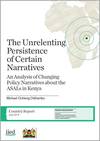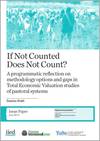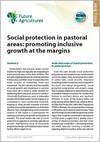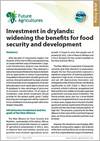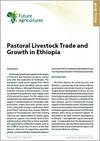The World Initiative for Sustainable Pastoralism (WISP) has now been in existence for a decade, a period during which considerable progress has been made globally towards sustainable pastoral development. Many challenges remain for pastoralists, but in the areas where gains have been made it is vital these are built upon and achievements are not squandered. This book follows WISP’s global approach and highlights key examples from its work with partners around the world. It identifies the impact of WISP’s work in empowering pastoralists through improved advocacy skills and better knowledge, and in helping to change policy and practice. Through case studies, testimonies and photos, this book aims to bring WISP’s global stories of pastoralism to a wider audience and identify opportunities for future success.
Year of publication: 2014Organization: Unión Internacional para la Conservación de la Naturaleza (IUCN)
Topic: Cambio climático, Economía, Servicios ambientales, Resiliencia
Language: English, Français
Type of document: Técnico
Geographical coverage: Global
Key stakeholders that included the pastoralists, farmers, and other natural resource users, civil society, the academia, key government agencies, faith-based organizations, the media and security agencies discussed and proffered lasting solutions to the security challenges associated with pastoralism in countries and across the region, to promote the improvement of pastoral production systems.
Year of publication: 2014Organization: Autores individuales
Topic: Conflicto, Organización
Language: English
Type of document: Políticas y legislación
Geographical coverage: África Occidental, África Central
The country report presents an analysis of changing policy narratives about the arid and semi-arid lands in Kenya. Kenya cannot achieve its development targets unless there are appropriate investments in the arid and semi-arid lands. These lands can make a significant contribution to national development and the failure to integrate them into the national economy is perhaps being the main reason for the failure of national development since independence. Investing in the arid lands is now a constitutional imperative and the institutional foundations for their integration into national development are now in place.
Year of publication: 2014Organization: Instituto Internacional de Medio Ambiente y Desarrollo (IIED)
Topic: Cambio climático, Economía, Servicios ambientales, Resiliencia
Language: English
Type of document: Técnico
Geographical coverage: África Oriental
The substantial value of pastoral systems remains largely invisible to local, national and regional calculations of economic performance (for example the construction of GDP). Official data continue to be used even when their reliability is known to be poor. A complementary framework in cost-benefit analysis, known as Total Economic Valuation, is increasingly being used by NGOs and regional bodies to help put onto the map the many aspects of economic value contributed by pastoral systems– contributions that are presently not counted. This issue paper provides a practical tool for those interested in carrying out work on the Total Economic Valuation of pastoralism.
Year of publication: 2014Organization: Instituto Internacional de Medio Ambiente y Desarrollo (IIED)
Topic: Economía
Language: English
Type of document: Técnico
Geographical coverage: África Oriental, Global
For thirty years, Agonlin region in Zou department has been subject to extensive movements of national and cross-border transhumance every year: it is a seasonal movement of flocks and their shepherds in search of water and pastures. The absence or weakness of structures and hospitality infrastructure, especially transhumance corridors lead transhumant animals to cause enormous damage to farmers with immeasurable drawbacks (destruction of crop fields and fallows, cattle raiding crops , raping women, slaughtering animals, etc.)
Year of publication: 2014Organization: Autores individuales
Topic: Conflicto, Pueblos indígenas, Organización
Language: English
Type of document: Técnico, Científico
Geographical coverage: África Occidental
Vulnerability and poverty levels remain stubbornly high and arguably are deepening in many pastoral areas of the Horn of Africa. This is in spite of galloping livestock commercialisation
in these areas and their closer incorporation into wider systems of marketing, trade and
investment. The fact remains that the benefits of recent growth and investment in pastoral areas have yet to result in wider benefits for addressing food insecurity and poor nutrition. Thus, strengthening social protection systems in the region is a prerequisite for realising more inclusive growth at the pastoral margins.
This brief details the role of social protection in agendas to promote agricultural growth, highlighting areas of innovative programme design and implementation where further efforts might focus.
Year of publication: 2014Organization:
Topic: Economía, Seguridad alimentaria, Género y juventud, Pueblos indígenas, Servicios sociales
Language: English
Type of document: Técnico
Geographical coverage: África Oriental
After decades of comparative neglect, the drylands of the Horn of Africa are experiencing an unprecedented surge of investment. But uneven investment can be a barrier to formal private sector engagement; and leave pastoralists more vulnerable to shocks and ill-equipped to take advantage of processes of economic transformation.
Therefore, this publication provides recommendations for investing in drylands for the greater public good. The recommendations are made with a view to ensuring that investment in drylands reinforces poverty reduction and food security.
Year of publication: 2014Organization:
Topic: Economía, Finanzas, Seguridad alimentaria, Tierra, Servicios sociales, Valeur ajoutée
Language: English
Type of document: Técnico
Geographical coverage: África Oriental
Although Ethiopia has seen dramatic increases in formal exports, it is less recognised that pastoralist areas supply most of the animals for export. For this supply to be maintained or increased, specific livestock policy support is needed based on consultation with pastoralists, traders and other private sector actors, along with stronger coordination of the government ministries that oversee different aspects of the production and trade system.
This policy brief presents a brief overview of the eco-political landscape of livestock trade, lessons learnt from livestock and trade programmes, and policy priorities for supporting pastoral livestock marketing.
Year of publication: 2014
Organization:
Topic: Economía, Pueblos indígenas, Participación, Valeur ajoutée
Language: English
Type of document: Técnico
Geographical coverage: África Oriental




